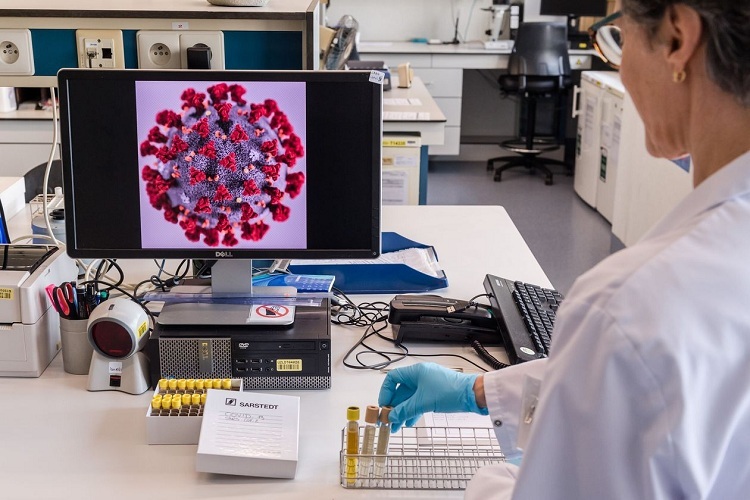Contact Admission
International Collaboration
AI vulnerability in the Covid-19 response
Medical technology companies are racing to launch preventive update applications, Covid-19 data ... but with great difficulties.
Some groups of artificial intelligence (AI) technology are in trouble: the management of diagnostic tools based on artificial intelligence is increasingly favored by companies, health systems and governments. regular doctor visit.
Such devices are also known as "symptom assessment" tools or medical chatbots. Theoretically, this seems to be a plausible short-term workaround. People can use it to assess for themselves or someone with Covid-19 infection, and to limit the patient's visit to crowded medical centers or emergency rooms where the virus can spread.
These tools are also very different algorithmically. Some are based on a relatively simple rule, such as a decision tree, to provide an online consultation on basic health. Other services say they use more advanced technologies, such as machine learning-based algorithms, to help diagnose precise problems.
However, the companies that own them also say they have to be very careful with algorithm updates to incorporate questions about nCoV. This hesitation further highlights the scant scientific understanding of the spread of Covid-19, as well as the limitations of AI-based medical technology in the face of new diseases, spread fast.

Researcher in Leuven, Belgium reviewed nCoV samples on February 29. Photo: WSJ
Some companies say they don't have enough data on new viruses to include in existing applications. Your.MD Ltd., a London-based healthcare company, recently added a "check nCoV" button on its platform. Pressing it leads to a series of questions about symptoms. But it is based on a simple decision tree. The company said it will not update the app with sophisticated machine learning technology.
"We're not doing that through AI because there's no scientific basis yet," said Maureen Baker, Your.MD's chief medical officer. She also said that it could take 6 to 12 months before reliable scientific documentation will be available to help rewrite the algorithms used in current applications.
Hugh Harvey, co-founder of Hardian Ltd., a digital medical consulting firm, says self-learning AI systems are built on machine learning that changes based on the new data they receive. So it is difficult to tweak for a new virus. That system needs accurate training data. Any previously less-known infectious disease, coupled with a scarce amount of data, could pose similar challenges, even with more sophisticated technology.
The UK has been at the forefront in the use of medical automation tools in recent years. The state-run National Health Service (NHS), which has partnered with several available chatbots on the market, introduces them to patients in clinics as an efficient, economical way to screen and Medical advice for common pathologies.
But during the Covid-19 crisis, the NHS instructed its partners to instruct people to call the national medical hotline if they thought they might have been infected. British health officials have confirmed 20 cases of Covid-19 in the country on February 28.
The NHS did not respond to requests for further comment.
Artificial intelligence can be of great medical help. But Dr. Keith Grimes, director of clinical innovation at Babylon said: "In the current situation, the tools are not ready yet."
Bright.md, an American health checkup app, automatically flags patients who might be infected with Covid-19 based on their online questionnaire responses. It will then connect a video call between the doctor and the patient.
According to Vnexpress.net
Other news
- How Dangerous Is Nipah Virus? Medical Alert and Urgent Health Recommendations ( 14:13 - 27/01/2026 )
- Predicting Disease from Sleep – A New Breakthrough Study ( 14:01 - 13/01/2026 )
- Medical advances predicted to break through in 2026 ( 13:54 - 12/01/2026 )
- Vietnamese medical miracles in 2025 – inspiration for medical students ( 07:54 - 07/01/2026 )
- Updating the SOFA-2 Score: A New Standard in the Assessment of Multiple Organ Failure After Three Decades ( 10:40 - 31/12/2025 )
- Home AEDs: High Life-Saving Effectiveness, but Not Cost-Effective at Current Prices ( 14:12 - 18/12/2025 )
- Artificial Intelligence and Pediatric Care ( 08:27 - 16/12/2025 )
- Applying Clinical Licensing Principles to Artificial Intelligence ( 09:36 - 08/12/2025 )
- U.S. Approves Targeted Lung Cancer Therapy Datroway ( 08:43 - 25/06/2025 )
- Therapeutic potential and mechanisms of mesenchymal stem cell-derived exosomes as bioactive materials in tendon–bone healing ( 08:38 - 23/11/2023 )


















